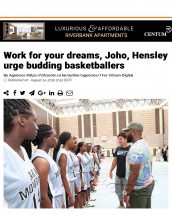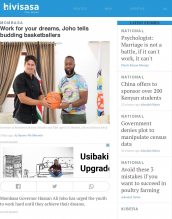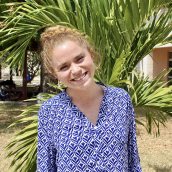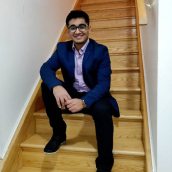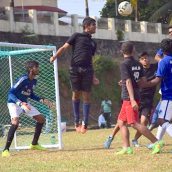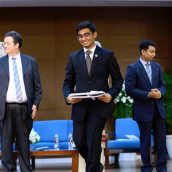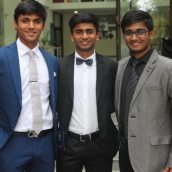The Times of India: Civil society has to be driven by competence as well as ethics: Aga Khan
In light of the inauguration of The Aga Khan Academy, Hyderabad, The Times of India reporter Ranjan Roy interviews His Highness the Aga Khan and focuses on his unique and forward thinking vision, which includes ethics, free-market economics, and civil society as essential elements of a well-rounded education.
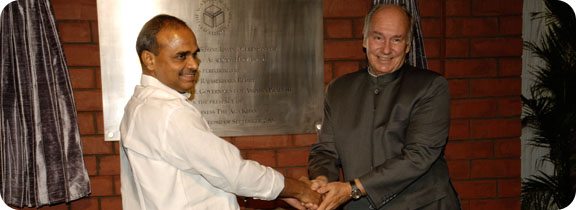
History
In 2000, His Highness the Aga Khan initiated a programme to establish an integrated network of schools, known as the Aga Khan Academies. The aim of the Academies is to provide education to deserving students at an international standard of excellence.
The Aga Khan Academies are part of the Aga Khan Development Network (AKDN), which has been involved in education in developing countries for decades. AKDN agencies currently run more than 240 schools and educational programmes ranging from early childhood through to post-graduate education.
In 2003 the first Academy was established in the Kizingo area of Mombasa, Kenya. A facility inspired by Swahili architecture, the Aga Khan Academy Mombasa is a state-of-the-art learning institution. It is recognised as an International Baccalaureate World School. The Aga Khan Academy Hyderabad was the second to open in 2011, and the third opened in 2013 in Maputo, Mozambique.
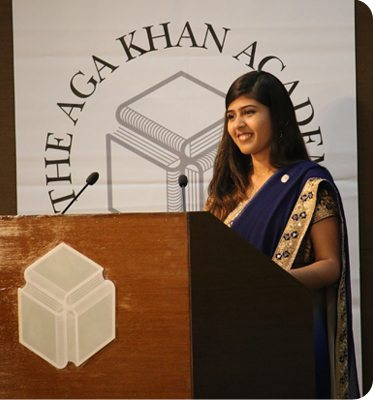 Establishment of the Aga Khan Academy Hyderabad
Establishment of the Aga Khan Academy Hyderabad
Construction of the Aga Khan Academy in Hyderabad began in 2006. The first intake of students was in August 2011 for the Junior School and 2012 for the Senior School, including the residential programme. The Academy has been accredited as an International Baccalaureate World School for the Primary Years, Middle Years and Diploma Programmes. The first class of the Senior School’s Diploma Programme graduated in 2014.
The Academy's Professional Development Centre (PDC) began operating in July 2010, prior to the opening of the school. The first programme offered by the PDC was a series on Professional Learning for Educators. These are collaborative courses designed by the Aga Khan Academies with input from government and educational experts. Their aim is to improve the education of both students and teachers within the region.
A global learning community
As further Aga Khan Academies are established, the vision is for them to become an interconnected network of schools that form a global learning community. The work of the Academies is also enhanced through partnerships with other educational institutions and the agencies of the Aga Khan Development Network.
Social diversity @ Academy – third cohort from Afghanistan
As part of His Highness’s vision to provide opportunities for exceptional students from the widest possible socio-economic contexts in order to change future outcomes across the developing world, our Academy talent identification team is travelling to Kabul next week to identify deserving students for 2017-18 scholarships.
Aga Khan Executive Leadership meets Council in US
“Opening the doors of opportunity” – Academies and Dr Fisher are sharing His Highness the Aga Khan’s vision and details of upcoming projects. 3:30-6:00pm, Sunday 27th August 2017 in Atlanta, USA.
Toronto Mayor speaks about us!
Mayor John Tory, who visited the Academy in March 2017, has written about his experience in an article titled, 'The year diversity defined our strength' published in the Toronto Star. Click here to read more!
Mahek Shah: Her dreams taking flight
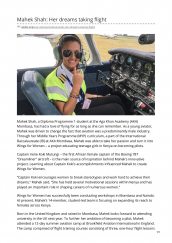
Clare McLaughlin: Encouraging growth at the Academy
Before we enter the 2019 – 2020 academic term, we would like to spotlight a few staff from AKA Mombasa who are going on to pursue new adventures in the upcoming academic year. Here, we take a look at Academy fellow Clare McLaughlin and her two years at the Academy.
Clare McLaughlin is from Warren, Vermont and was an Academy fellow at the Aga Khan Academy Mombasa. Clare was focused in the Service Learning programme
and involved in other programmes around the Academy.
During her time at the Academy, Clare said she is grateful for the various people she was able to work with.
“My time at AKA Mombasa has been an incredible opportunity to learn and grow,” Clare said. “Foremost I’ll miss the students who were immeasurably thoughtful, hilarious and motivating. Students were the center of everything I did and valued in my time at the Academy so I’ll miss them the most. I’ll also miss the friendships I’ve made with staff across the Academy - from the Administration block to the dorms - the Academy staff always kept me laughing and learning.”
Clare said she was able to recognise the value of pluralism at the Academy, which she believes will help her in her future.
“I feel fortunate that on each team I worked with, I heard different perspectives and had to challenge myself to see problems and solutions from every angle,” Clare said. “I value this immensely and will carry with me this standard of listening and collaboration.”
Throughout her fellowship, Clare said she enjoyed the opportunities she was given to work on various projects and programmes, while also improving the Service Learning programme for the years to come.
“The best part of the fellowship is its flexibility to try new things, work with an array of groups and interests in the Academy, and propose creative solutions to challenges,” Clare said. “I especially enjoyed serving as a mentor, working on the girls’ football programme, working on the Exchange Programme with the Academy in Hyderabad, and working to make Service Learning more community-centered, effective and sustainable.”
For her next adventure, Clare said she plans to go back to school for her Master’s degree.
“I am attending Stanford University to pursue a Master’s degree looking at education for sustainable development,” Clare said.
George Kamau Gachoya, an Environmental Systems and Societies teacher at the Academy who Clare worked with as a teacher’s assistant, said he admired Clare’s work ethic and the various new ideas she introduced to his class.
“Clare is a diligent and an outspoken person with whom I have had an opportunity to work with in the last two years as my protégé in the ESS class,” George said. “She is meticulous in planning; the resources she prepared for the lessons she helped deliver were always enriching and promoted deeper understanding of concepts. She introduced Freakonomics radio to the class and organised for class discussions initiated by students on hot environment topics of the week that they could pick from the media. She is friendly, but also very firm when dealing with students. Her keen eye could quickly pick students who were not using their lesson time productively.”
Ariq Kapadia (Class of 2017): Using creative planning to make an impact
My time at the Aga Khan Academy Hyderabad has been a wonderful journey for me. I went through series of experiences that has made me what I am today. My friends, teachers and everyone around me had an integral part in shaping my life. I joined the Academy back in 2012 and the residence experience was completely new for me. I was frightened by the fact that now I must live away from my parents at such an early stage. This could typically be a nightmare for some students, but for me it was incredible – reflecting on my time there only makes me want to go back and relive my life at the Academy residences. Getting up for school, all the students racing for the washrooms only to win the chance to take the bath first. Planning out sports schedule in lunch breaks just to play a good soccer game after school. All this has been fun and amazing, and it has taught us students a way of life.
The Aga Khan Academy Hyderabad has been well known for years for their participation and success in soccer. Being an integral part of this team was a joyous and proud experience for me. I was selected for the team back in 2013 – at that time, our team had just started their dominance in the city while we were still preparing ourselves for other challenges at school. It was tough at first to balance sports and academics alongside other projects and activities; however, we slowly got acquainted with it. We used to plan out training times before and after school and commit ourselves to the sport. It helped me improve my punctuality and taught me a lot about time management. Soon after, I had the privilege of leading my U-16 team to the finals on home soil; unfortunately, we ended as runners-up, but the experience I gained while leading had brought some significant change in my behavior. I had grown a sense of responsibility and maturity – I had learned to be a leader. It did bring us trophies back to back for the next few years, but the true realisation for success came in 2016 when we got an opportunity to challenge teams at the national level. It was the first time a squad of eight students were sent for the TAISI tournament to represent the Academy. It was foremost the proudest moment of my life, standing alongside my teammates, ready to take up some of the best teams in India. Successfully, we won the tournament and brought the trophy back home, the first-ever away trophy that the Aga Khan Academy Hyderabad has ever won. Achieving such feat has been overwhelming, but the values I have learned in this experience will remain within me and will shape my future.
Along with sports, I completed various projects at the Academy. As part of our IB [International Baccalaureate] requirement, we had to complete personal projects and Extended Essays in order to pursue our interest in researching about various things through variety of subjects under experienced supervision. Not only did these projects let us gain experience in detailed researching, but it also helped create awareness in specific regions. These projects were bounded with criteria, ranging from personal interest to benefits in society and impact on environment. It made us think about the different aspects and potential effects of our projects, and in turn adopt a broader approach to our research. My project was about city planning and making solar energy the primary source of energy. I aimed to create a small model that gives a better representation of my idea about proper city planning. It was my first time working with wires and solar cells. I had to learn to make a solar plant model and integrate it in the main model. It really was great fun, and I learned the importance of city planning to reduce space wastage and save energy by using alternate renewable sources of energy. My Extended Essay was based on my favorite topic: healthy food. I conducted chemical experiments on food to check the alteration of protein content in food when cooked or uncooked and when hot or cold. My aim was to understand the effect of temperature on food. It went well and it answered some questions I personally had as well. I used dangerous chemicals and chemical equipment throughout my Extended Essay. I improved my personal skills in areas such as communications and built confidence in my ability to work individually. I learned more about society and gained a variety of knowledge on environment preservation.
During my time at the Academy, I have developed skills and values from certain experiences, but it was my participation in Model United Nations (MUN) that had a significant effect on me. I started participating in MUN to enhance my verbal skills and improve my knowledge about events happening around me. Over a period, I swiftly transited to the logistics group. I realized that my ability to manage and plan were beneficial to these events. I was given a chance to assist the Under-Secretary-General of Logistics and soon after I claimed the title for myself. Through this experience, I improved my management skills, developed various approach to different problems and mastered problem-solving skills as a result. I was given the opportunity to lead the Academy’s first ever METROMUN Conference, which allowed students from various schools to participate. The challenge of managing other students was very beneficial to me as it has boosted my confidence in my management skills. Once I had experienced managing MUN, I sought more knowledge and experience in this area – this helped me get into a co-op programme where I am currently working on certain projects and managing project teams to get the best results.
Over the period of time I spent at the Academy, I applied a common skill to all the initiatives in which I took part: strategic planning and creativity. Whether it was sports, projects or MUN, I was fond of innovation and had always been busy with creating something with whatever I had around me. When we plan our strategies for a soccer game, I loved coming up with interesting formations which sometimes didn’t make much sense. I would never give up trying to find a better one, sometimes I would modify the existing one or would come up with something new. Similarly, in MUN, I would plan to change the setting or come up with a different style of conducting the conference. I always looked for alternatives for the existing ideas to make them better or search for a new one to improve efficiency. All these made me realise that engineering is what suits me well and my interest in aerospace and machines brought me to continue my studies in Mechatronics Engineering at the University of Waterloo. Henceforth, with such knowledge, I can pursue my dream of developing my home town and making India prosperous in terms of knowledge and technology and to help His Highness achieve his vision of eliminating poverty.
All this knowledge and these experiences have helped me get into the University of Waterloo. Studying at my dream university is a direct result of what I have accomplished through hard work, determination and focus. My friends and teachers at the Academy supported me throughout, and all the memories I have from there still teach me various things in life. The experience that I had in those five years at the Academy continues to develop me further and make me more capable of success. In my engagement with activities at the university, I have found that all the skills I learned at the Academy have prepared me to face the upcoming challenges.
When I look back to five years ago, I see a small kid, terrified and trying to surpass the ranks. However, now five years later, even though I am still trying to achieve my goals, I feel ambitious and determined, not scared but instead craving to prove myself. I have had a lot from the Academy and now I feel it is my time to give back to society to make this world a better place to live in.
By Ariq Kapadia
